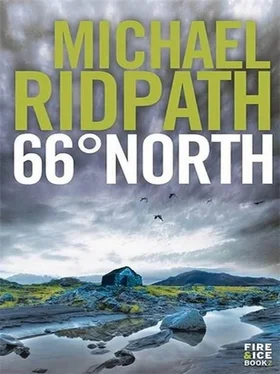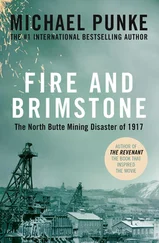‘Ólafur out!’ Sindri roared suddenly, punching a fist in the air.
The big man was a magnificent sight, bellowing his lungs out, his ponytail bobbing.
Harpa glanced at Björn. ‘Ólafur out!’ she shouted.
Night fell. The protest intensified. The older protesters left: the proportion of demonstrators with their hoods up and faces covered increased. The Christmas tree in the middle of the square toppled: in a moment it was on fire. Drums beat, people danced. Harpa and Björn stuck to Sindri, who moved through the throng chatting to all and sundry between bellows. Following him, Harpa felt part of the crowd, and her anger flared again.
Finally, the police had had enough. ‘Gas! Gas!’ the crowd shouted.
A moment later something stung Harpa’s eyes. She bent over and Björn pulled her away. Something tickled her throat. They ran back out of the square, surrounded by hundreds of people, escaping before all but a particle or two of the gas reached their lungs. They lost Sindri for a moment, and then found him talking to a young man with his shirt off plunging his face into a bucket of water. The boy had spiky red hair and his torso glowed pink in the cold and the light of the flares. Sindri seemed to be congratulating him and slapping him on his back. The boy was shivering, but he was angry and the anger was keeping him warm.
They were standing a couple of hundred metres away from the square, right next to the impressive statue of Ingólfur Arnarson, who was that first Viking settler to step ashore in Reykjavík’s smoky bay.
‘At least the gas doesn’t bother him,’ said Sindri. ‘If the country was still run by people like him they’d know exactly what to do with the bankers and the politicians.’
Harpa admired the statue’s strong muscles. ‘I wonder if he really looked like that,’ she said.
‘He always seemed a bit camp to me,’ said Sindri. ‘The way he’s leaning on his shield, sticking his hip out.’
‘Oh, no,’ said Harpa. ‘He’s all man.’
‘He was probably short and fat with a double chin,’ said Björn.
The three of them laughed.
‘Come back to my place for a drink,’ Sindri said to Harpa and Björn. ‘It’s just around the corner.’ They exchanged glances: if you will, so will I.
‘OK,’ said Harpa. So they followed Sindri, together with the boy who was still bare chested, waving his shirt in the air in disgust.
‘Another one, Harpa?’
Harpa nodded as Sindri refilled her glass from the brandy bottle. Her head was pleasantly fuzzy, the alcohol adding to the chemicals released by her own body during the glorious turmoil of the demonstration. It was weeks since she had had a proper drink. She had always been suspicious of people who drank in the middle of the week, but this was no ordinary Tuesday.
They were in Sindri’s small flat, the five of them: Sindri, Harpa, Björn, the red-haired boy and a short, neatly dressed man, young enough to be a student, who had latched on to them somewhere along the way. The boy’s name was Frikki, and the student’s Ísak.
Sindri was enjoying himself, playing to the small crowd, and in particular playing to her. He had seated her next to him on a tatty sofa, Björn and Ísak the student sat on old armchairs facing them, and Frikki was slumped on the floor. The flat was a dump: small, cracked ceiling, scratched wooden floor, books, newspapers, magazines and ashtrays filled with cigarette stubs everywhere. There was washing-up in the sink in the alcove of the room that acted as a kitchen. The only things brightening up the place were three or four landscapes dotted around the walls, the biggest of which portrayed a farmer carrying an unconscious girl over the moors.
They had finished a bottle of red wine and were on to the brandy.
Harpa played up to Sindri; she was flattered by the attention and what he said was interesting. But it was Björn she was most aware of. He sat coolly listening to Sindri, calm, composed and furious. He wasn’t trying any of the classic male competition for her attention, but she did catch him shooting the occasional glance at her.
She was enjoying herself. For a moment she felt guilty about leaving Markús, but her mother would be very happy looking after him. She was always telling Harpa to stop moping around, to get out more and meet a man. She was right. Since Gabríel Örn had betrayed her, Harpa had spent nearly all her time cooped up in her little house in Seltjarnarnes.
‘I know I don’t look like it,’ Sindri was saying, ‘but I am a farmer. Or at least my family are farmers. Until the bank forces them to sell up, that is.’
‘What happened?’ Harpa asked.
‘Everyone’s getting squeezed,’ Sindri said. ‘Even the farmers. My brother, who runs the farm now, can’t make his payments. So it’s finito .’ Sindri made a throat-cutting sign with his forefinger. ‘Just like that. A farm that has been around for generations, that was mentioned in the Book of Settlements, is destroyed. It breaks my heart.’
It was Harpa’s understanding that farms were one of the few sectors of the economy actually doing well with the fall of the króna, but she didn’t want to contradict Sindri in full flow.
He turned to her. ‘It is the farmers who are the real soul of Iceland. Like Bjartur there.’ He pointed to the painting of the peasant carrying the girl. ‘I did that, you know.’
‘It’s good,’ said Harpa. And it was. You could tell the brush-strokes were by an amateur, but the painting managed to portray nobility in a harsh but beautiful landscape.
‘The farmers and the fishermen,’ Sindri went on, taking the compliment in his stride. ‘Men who will work hard in tough conditions, who save, who fight to earn a living on the fells or on the waves. And not just men, women. We have the toughest, most independent women in the world. We have needed them to survive. And now these bankers, these lawyers, these politicians, all they know how to do is spend and borrow, spend and borrow. The kids of today don’t know how to do real work, what it’s like to tramp over the fells in a howling gale looking for lost sheep.’
‘Some of us do,’ said Frikki. ‘Until two weeks ago I spent all my waking life in a hellhole of a kitchen producing food for these guys to eat. And the prices they would pay! Ten thousand krónur for some swordfish flown in from the Pacific when we have perfectly good fish of our own all around us.’
‘Sorry, Frikki,’ Sindri said. ‘You are right, not everyone has forgotten. There are many of us perfectly good Icelanders still willing and able to do real jobs. We have always been here. It’s just no one has listened to us.’
Harpa wondered whether Sindri had ever done a ‘real job’ since he had left the farm. But he had a point. He was just the kind of guy she would have dismissed with contempt as an ignorant idealist a couple of months before, but now she thought he had a point.
‘What chance have I of finding a real job?’ Frikki asked. ‘There’s nothing out there.’
‘What about you, Björn?’ Sindri asked.
‘I’m a fisherman,’ Björn said. ‘From Grundarfjördur. I rode down here on my motorbike this morning for the demonstration. And I agree with you, Sindri. I go out as often as my quota will allow, and I still can’t earn enough to pay off my debts. There are many like me. The banks told us to borrow in foreign currencies because the interest rates were lower. And now they say that not only have my own debts doubled because of the collapse of the króna, but I have to pay off all the money the banks borrowed from the British and the Dutch to lend to me too. It’s absurd. Mad.’
Harpa felt distinctly uncomfortable with the way the conversation was going.
Someone else had noticed her discomfort. ‘What about you, Harpa?’ It was Ísak, the student. He was watching her closely. She could tell he had somehow guessed what she was, or what she used to be, despite the months of unemployment. Was it the way she spoke, her clothes, something about her attitude? Harpa didn’t like him. There was something creepy about his cool detachment, something at odds with the outrage of the rest of them. But she had to answer his question.
Читать дальше












